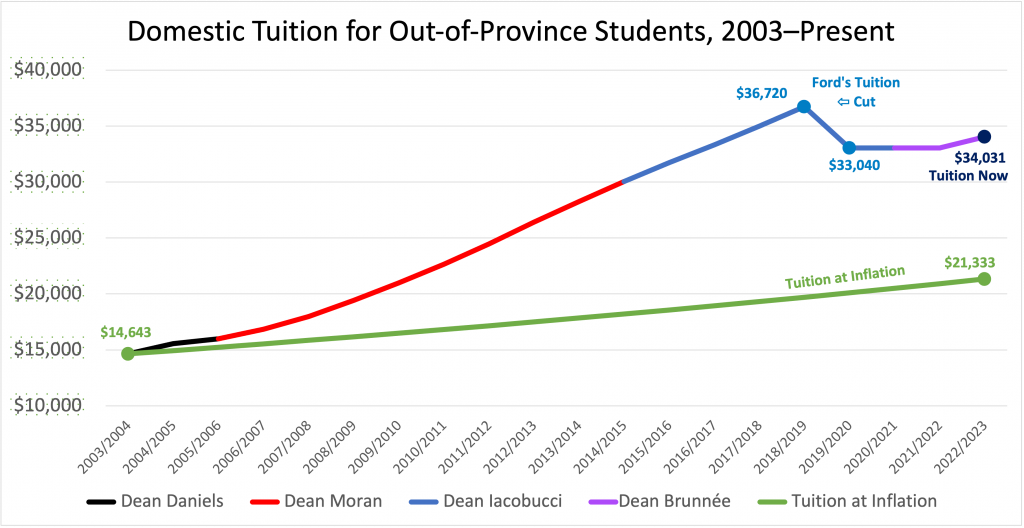Differentiated tuition fees spark outrage amongst out-of-province students
On March 31, 2022, U of T’s Governing Council approved a three percent increase for domestic non-Ontario resident student (colloquially, out-of-province student) undergraduate tuition across all faculties at the University. In their reasoning, Governing Council cited Premier Doug Ford’s 2019 tuition cut and the ongoing cap on domestic tuition increases as justification to raise tuition for students who reside outside of Ontario. According to Governing Council, with rising operating costs and declining international student tuition revenues during the pandemic, they didn’t have a choice. Governing Council also approved a five percent increase on international student tuition.
While the three percent increase may be minor on a $6,590 tuition bill, the same cannot be said for our law school. At the Faculty of Law, tuition is already thousands of dollars higher than every other law school in Canada. The extra three percent is the last straw. With this increase, the highest ranked law school in the country further risks losing top talent from across the country, in exchange for roughly $120,000 (the approximate amount the tuition increase will generate) on top of a $30 million dollar budget. Students have already contributed significant time and effort advocating against U of T Law’s high tuition rates, but to what end?
Last year, Dean Brunnée struck a Tuition Roundtable, seeking constructive feedback about tuition-related issues. Shortly after the last Roundtable discussion, students became aware of Governing Council’s intention to increase tuition for out-of-province students. Students were blindsided by this decision, immediately turning to Dean Brunnée and Faculty Council to advocate for the out-of-province student population at U of T Law, which comprises roughly one fifth of the student body. Instead of advocating, the Faculty was silent, tacitly accepting the tuition fee changes. We took that personally. The Students’ Law Society (SLS) vocally opposed the policy decision. 2021–22 SLS President Willem Crispen-Frei gave impassioned and well-researched speeches at both Faculty Council and Governing Council. We were told that it was out of the law school’s hands. After volunteering *literally* hundreds of hours advocating on behalf of students to lower tuition, we were met with an even higher tuition invoice.

Doug Ford’s tuition cut in 2019 provided students at the Faculty with much-needed relief from the exorbitant tuition debt load. This relief, however, was short-lived. Despite good faith efforts to address the tuition issue, Dean Brunnée has followed the same path as her predecessors.
Besides tuition, out-of-province students already pay more to attend U of T Law compared to their Ontario peers. Students must cover moving expenses to and from Toronto, flights home for holidays, travelling for job interviews, and the cost of storage over the summer if they work in their home province. On top of that, the option to live at home and save money on rent and groceries is not available for any out-of-province students (we acknowledge that this is not an option for many Ontario residents either). All of these expenses add up to an enormous debt load, larger than many domestic students. And the kicker? The salaries are lower in our home provinces.
If you, like us, are already here, not all hope is lost. There is always the option to transfer, or go on a Letter of Permission, to another Canadian law school. You could even go on exchange to take a break from it all—it won’t do anything to lessen the financial burden, but at least you get to explore somewhere new while descending into debt. But hey, if you’re set on sticking around, join the Out-of-Province Students’ Association and commiserate with the rest of us, or write a cathartic op-ed piece for Ultra Vires!
At this point, you might be thinking to yourself “why attend U of T Law if you’re from out-of-province?” To which, we would counter that U of T Law markets itself as the best legal education available in Canada—the professors are world-renowned, the corporate employment opportunities are plentiful, and your peers are brilliant. Why should out-of-province students be precluded from attending? Assuming you get accepted as an out-of-province student interested in attending U of T Law, it should be your choice to attend, free from additional financial burden. Whether it’s worth the money should be up to you, though in all honesty, we’re not sure it is. We are abundantly aware that the cost of tuition for all students at U of T, whether from Ontario, out-of-province, or outside of Canada, is absurdly high, but those issues are outside the scope of this piece.
So, to the out-of-province 0Ls out there contemplating which school to attend, think twice. U of T Law prioritizes students from Ontario, maybe you shouldn’t prioritize U of T.
Editor’s Note: Meaza Damte (3L) is the President of the Student’s Law Society





